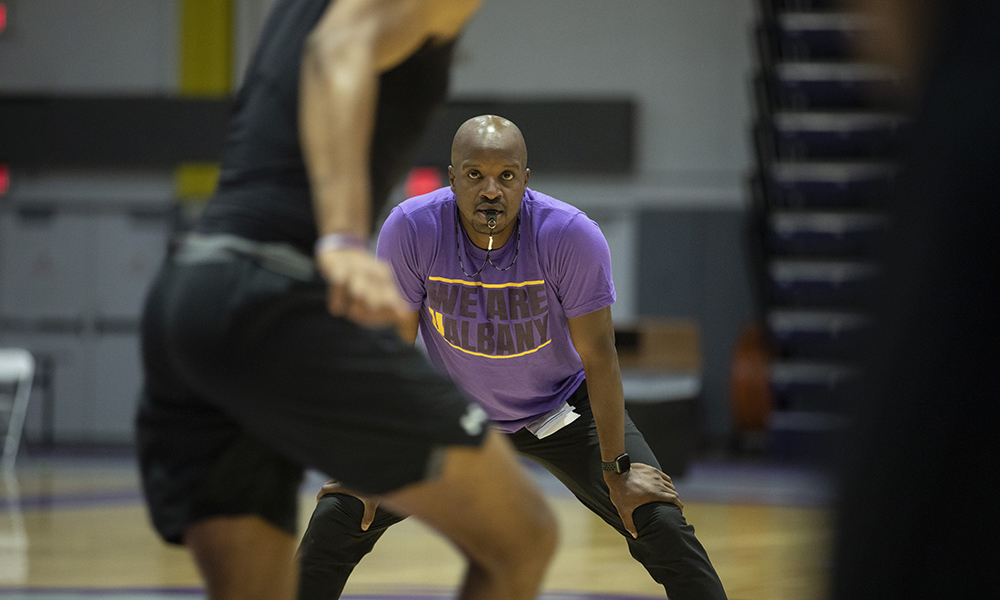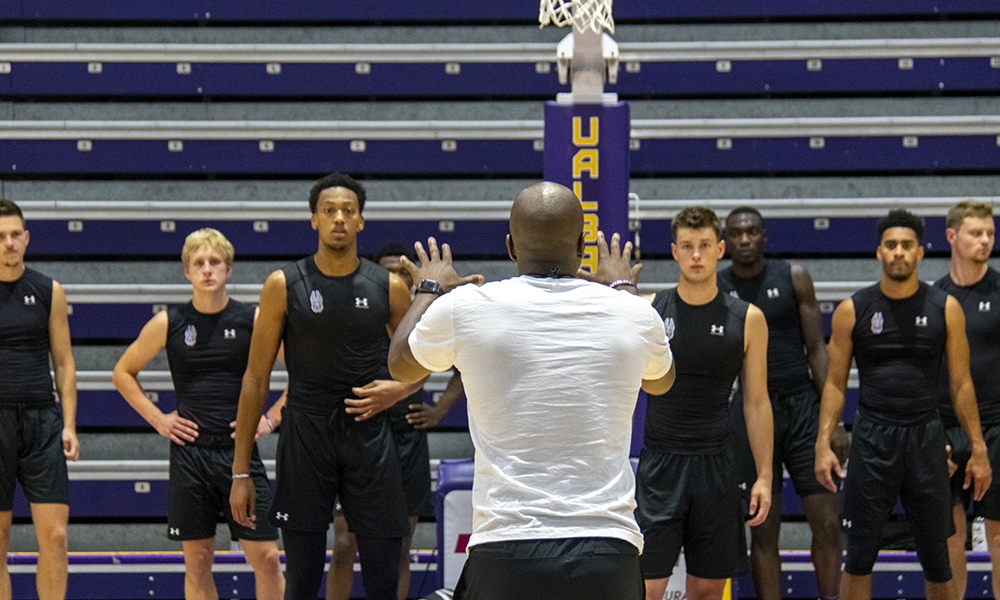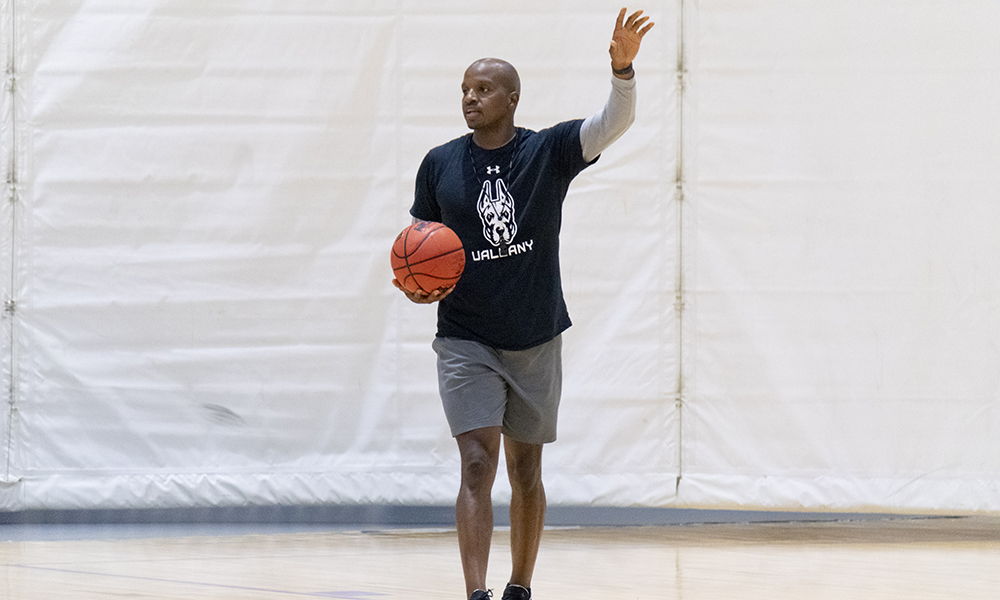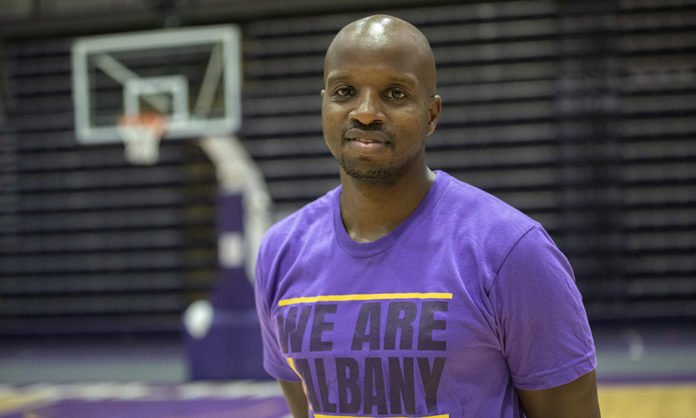UAlbany men’s basketball fans could use a mulligan after the 2020-21 season. The pandemic had a lot to do with that; a surge in COVID cases within the university’s walls last winter sent the entire campus into periodic pause mode and then full lockdown. And the university’s sports programs, which require a rhythm, a steady diet of practice and coaching, and most importantly, fan participation to succeed, suffered. The men’s basketball team played a pandemic-shortened season to empty arenas, and in the end, the Great Danes finished a disappointing 7-9—6-6 in America East Conference play—their third straight losing season.
All of that added up to the departure of longtime head coach Will Brown, who had been with the team for 19-and-a-half years, logged a 315-295 career record with the team and earned a quintet of trips to the NCAA Tournament. Soon thereafter, UAlbany’s director of athletics, Mark Benson, kicked off a nationwide search for Brown’s successor.
The man Benson chose, Dwayne Killings, is something of an anomaly in collegiate sports history, at least, up until recently. In the years before 2020, nationally speaking, college athletics programs were largely bereft of BIPOC head coaches. But after last May’s worldwide reckoning, following the murder of George Floyd, colleges and universities woke up to a new reality, which led to a surge in the hiring of Black head coaches, a trend that has shown no signs of slowing down.
But Killings isn’t just some nationwide stat; he’s a veritable gem. Just 40 years old, he has already amassed an enviable résumé, one that has seen him coach at basketball’s highest levels. Killings, who originally hails from Amherst, MA, and was a walk on for two years at UMass Amherst as a player, most recently served as assistant/associate head coach at Marquette University in Milwaukee. Before that, he was a special assistant with the NBA’s Charlotte Bobcats and worked in player development in the D-League; followed by an assistant coach at NCAA powerhouses Boston University, Temple University and the University of Connecticut.
Killings has also served on the NCAA Division I Men’s Basketball Ethics Coalition, one that helped promote ethical conduct among NCAA Division I men’s basketball coaches through education, leadership and mentoring. And co-founded his own social justice organization, Coaches For Action (more on that below).

Killings’ role at UAlbany marks his first turn as a head coach—and it’s clear that he’s more than ready to do the job. Capital Region Living talked to Coach Killings about his incredible career, the important work he’s done to level the playing field in collegiate sports, and what he’s hoping to get out of his debut season with the Great Danes.
You’re a native of Amherst, MA. Tell me a little bit about your upbringing. Was basketball always in the cards for you?
I was born and raised in Amherst, and I used sports to create community. I think that really helped me meet people and get comfortable. When I was growing up, my dad worked at the University of Massachusetts for over 40 years, so when I was young, [Coach] John Calipari came to town and built the UMass program up, and I was lucky enough to be a ball boy for the program. I got a chance to see [collegiate basketball] up close and personal. So it was kind of a way of life in the town at that time; time stopped when the team was playing. I fell in love with basketball at a really young age.
How did you make the transition from player to coach? Were you seeing things on the court that your fellow players weren’t?
I obviously wasn’t as talented as the other guys on the [UMass Amherst] team—I was a walk on. But I loved to work hard at it, being a part of a team and competing at practice. I found myself really curious about why we were doing what we were doing. I talked to Geoff Arnold, who was an assistant coach; and Bruiser Flint, who was our head coach, who is now a mentor and second father to me. The thing that I loved was that [basketball] galvanized the community. It created these opportunities for kids that wouldn’t have had the same kind of opportunities I was having. My parents did well enough, but there were these kids who were really talented from different worlds than mine, and they would come to campus, and we’d become a team. They’d hear my life stories, I would hear theirs. And I started [thinking], This is a great way to impact people, and it’s a great way to compete. It’s a great way to do something bigger than yourself. I fell in love with the competition, the teaching, the kids, the opportunity, the camaraderie, the challenge of it. Coaching, especially in college, is different, because you have a lot of different things you have to manage and try to master as you’re going through it. It was fun; it was never work, so I knew I always wanted to be in basketball when I got into coaching. Every day was fun.
Your coaching résumé is packed with NBA and NCAA teams. Why come to UAlbany?
I’m a Northeast guy, so although we’re coming from Milwaukee, the Northeast is who I am, through and through. I think a lot of being a head coach is [about] fit, but it’s also the relationships; you’ve got to be able to recruit kids, get people to get excited about your program. A lot of that is going to be based on who you are and what you’re about. I really, really love partnering with [UAlbany Director of Athletics] Mark Benson. He’s a great partner, a great boss, and he’s got a really good vision. Havidán Rodríguez, [UAlbany’s] president, [has] great vision and is a great leader, so it just checked a lot of boxes and made a lot of sense.

You have a lot to prove in your first season with the Great Danes. UAlbany had a losing season last year, and you’re succeeding a coach who was there for 20 seasons. What should local fans know about you?
I’m passionate and driven. You’re going to see excitement from me and my staff; we love doing what we’re doing, and we love seeing our kids grow. When a kid has a moment, where you’ve been trying to get him to do certain things, and he does it, it’s like you unlocked a whole other level of who he is and his potential. But I’m just a normal guy who gets to live out his dream—who wants to create a program that wins at the highest level and who people love to come and support. Do I have a lot to prove? Yeah. But people in the community have a lot to prove [too]—that this is really a basketball school and basketball town. To get really good recruits, we need to have a packed building. To win big games, you have to have a packed building. It doesn’t just happen. I’m putting my heart and soul into this, and my staff is doing the same, working a lot of long hours, because we want these kids to win and we want [the UAlbany men’s basketball team] to have success.
You mentioned that you love unlocking players’ potential. Can you give me an example of a breakthrough you’ve had since you arrived on campus?
[Guard] Will Amica is a kid we have in our program who is from Syracuse, NY, and we have a leadership academy that we started, and we do a lot of player development, we do a lot of mental work. I’ve seen [him mature], and all of a sudden, his play gets better, and I think that really gets you excited, because the culture of the program is becoming strong. And I say “becoming,” intentionally, because I think that’s a revolving process for us, being a new program. I think the other part that I really love is we push our kids really hard, we coach them hard and we love them hard. The thing I’m most appreciative of is the kids value it and the parents value it. That means you’re doing it the right way. People have really taken notice to our approach. I’m not sitting here saying our approach is better than anybody else’s, but it’s the right thing for us, and I know that it’s going to produce opportunities to win. And that takes time. It doesn’t mean we’re going to roll balls out here and start playing games and [winning] 15 in a row. Learning how to win is an everyday process.
You founded Coaches For Action, an organization that supports the social justice movement and awareness of it in collegiate basketball. How did that come about?
It was [founded by] a group of my peers in the Big East, when I was at Marquette. We came together to create a group of 21 minority assistant [coaches] that tried to do three initiatives: (1) voting awareness; (2) raise money for a scholarship—we raised close to $10,000 [for a student to] attend one of the Big East institutions; and (3) to get a Black Lives Matter patch on uniforms last season. I was really proud of the work that we did. The assistants in the Big East that are there now are going to take [control] of that group. The reason why that group was started was, because it was needed. There was a massive need in that moment for guys to step up and lead and carry on conversations and have some conversations that might’ve been uncomfortable. I’m hoping that as we get settled here into the season, that we’re going to find opportunities to create an impact. And it doesn’t have to be just social justice; it could be things on our campus, things in our community that our program can help with. I hope that our program can be a vehicle or platform to create change, and change doesn’t have to always be identified through race relations. It could be as simple as a fundraiser for certain projects in the community, or giving a family an opportunity to smile at Thanksgiving or Christmas. We want to be a program that’s a beacon of light for a lot of people.
The UAlbany Men’s Basketball program has a motto: “Great leaders, great champions, Great Danes.” Does your coaching philosophy fit snugly into that context?
I’m hoping that we become champions—[but] that’s a process. And I do believe that in order for you to win, you’ve got to grow your guys as leaders. Whether it’s the youngest guy or the oldest guy in the program. We need strong leadership on the court, we need strong leadership in society, and I think, just being Great Danes, what comes to mind for our [players] is valuing the opportunity that they have, knowing what it’s like to represent this program. I say to our guys all the time, “You represent the people that came before you as players, as students, as people in the community, as people on campus.” They need to value that opportunity, because it’s an honor to be able to get a scholarship and wear a jersey and compete, and do the things these kids get a chance to do.

Your first home game is November 9 versus Towson. What’s your main goal other than winning?
[laughs] I’m hoping that we create a first-class environment when people come to the [SEFCU] Arena. There’s people that I’ve met that want to support me, who want to support our assistant coaches. That’s why they’re going to come to the game. Now, the experience we give them, both on the court and in the arena—the food, the concessions, all those things—that’s going to dictate if they come back. I want to make sure those things are first class. The other thing is I just want our guys to play hard. I want them to have a good time, to be passionate, to be intense. I want people to say that this group is real. Now, we might be great on Night 1 or we might have an opportunity to grow. But if we’re playing hard and we’re doing things the right way, that’s great. Somebody I used to work with used to say, “It’s better to be strong and wrong than weak and right.” And I want us to be strong. I want them to do everything they can do to be strong, intentional, play hard, have a good time and try to chase an opportunity to win.
You have a young son and daughter. Are they proud that Daddy is UAlbany’s head coach, or do they just want to watch the next Netflix series?
Probably a little bit of both. [laughs] It’s funny, they do say it to people, and I think there’s a sense of pride. They’ve grown up around basketball, so I think they like to know that they can come in the gym and be a little bit louder and act up a little bit more because of the position that I’m in. I was telling our guys the other day: For me to live out my dream and my kids to see it means that they know that anything they want is possible, so that’s the most rewarding thing for me. And then I try to say that to my [players]. Because I look at these guys like they’re my sons. Now I have 17 kids. That’s a lot. It’s a big family.
Get tickets to watch the Great Danes compete this season here.





